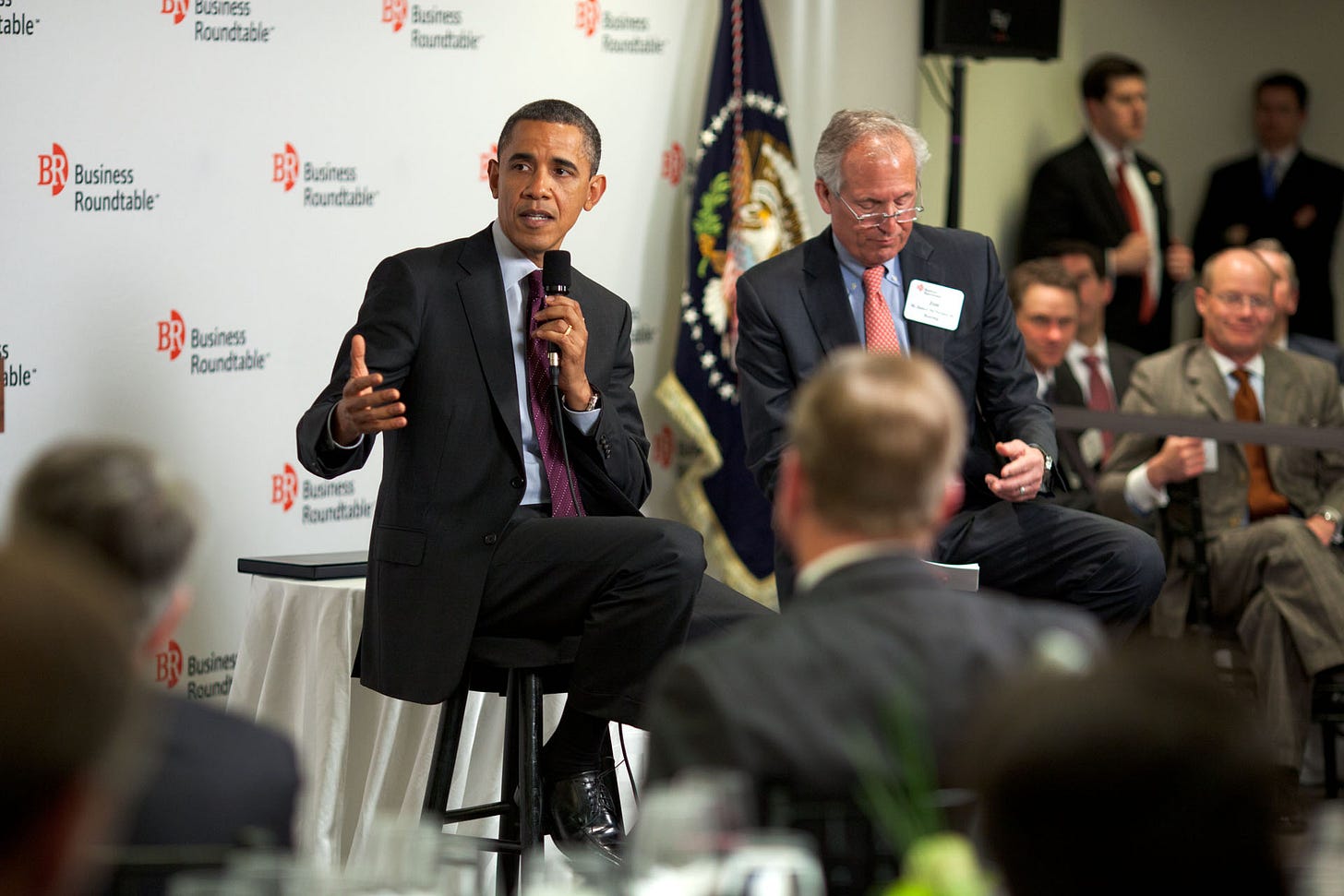Entitlement of the CEOs
The chief executives would like your gratitude, ok? (Part One)

It was the summer of 2010, and America’s most powerful CEOs were not happy with President Barack Obama.
You might have thought they would be thrilled. Stock markets had rebounded swiftly from the financial crisis; before the end of the year, corporate profits would surpass their 2006 peak.1 The Department of Justice had declined to prosecute executives for the reckless and predatory business practices that caused a global recession and inflicted ruinous consequences on millions of people.2
Meanwhile, despite their contributions to the economic collapse and their steadfast opposition to the Obama administration’s financial reform efforts, CEOs’ influence in Washington had, if anything, grown stronger.3
Earlier that year, Obama had spoken to the Business Roundtable, a lobbying group for chief executives of large U.S. companies.4 The Business Roundtable had also scored an audience with Obama in 2009, just as its members had with every sitting president since Richard Nixon. Business Roundtable members regularly passed through the White House for meetings, state dinners, and other events.5
By the summer of 2010, it seemed, CEOs had it all: profits, paychecks, and political power. Yet by their own telling, what they’d really had was enough.
In June of that year, Ivan Seidenberg, then the head of the telecommunications giant Verizon, spoke for many of them in his role as chairman of the Business Roundtable. “Frankly,” Seidenberg lamented, “we have become somewhat troubled by a growing disconnect between Washington and the business community that is harming our ability to expand the economy and grow private-sector jobs in the U.S.”6
Earlier in the year, Seidenberg had dined with the president and met with him numerous times. He even had been invited to Obama’s Super Bowl party.7 Under Obama, moreover, the federal government had topped up corporate coffers with billions of dollars of taxpayer bailouts—including some $1.5 billion worth of Verizon debt—and billions more in stimulus money.8 (Verizon’s bailout came just weeks after Seidenberg criticized government subsidies and promised that his company wouldn’t need a bailout.9)
Nevertheless, speaking at an elite Washington, DC club billed as “a forum where area business leaders could broaden their sphere of influence,” Seidenberg claimed that these leaders weren’t being heard.10 The Obama administration, Seidenberg said, had “create[d] an increasingly hostile environment for investment and job creation here in this country.”11
***
Six months later, Seidenberg and his fellow chief executives were feeling better.12
In July 2010, Obama named the Verizon CEO and four other Business Roundtable members to the “President’s Export Council.”13 During the December lame-duck congressional session, the White House and Democrats in Congress agreed to extend all of the Bush-era tax cuts, a massive win for wealthy Americans and corporations, and a key goal of the Business Roundtable. (On a single Wednesday earlier in the year, the group brought 87 CEOs to Capitol Hill to lobby for the extension.14) On top of the tax cuts, the administration also advanced a free-trade agreement with South Korea, another top Business Roundtable priority.15
What appeared more important to CEOs than the policy victories, however, was that they felt heard and appreciated. Obama had “shown a willingness to learn,” Seidenberg said, patronizingly.16 The Business Roundtable’s executive director for external relations said that the group was pleased by the absence of “criticism of industry groups or CEOs as a class” from the president.17
How did public policy in the United States come to be shaped by people who happen to be good at climbing corporate bureaucracies and generating short-term profits for their investors?
How did businesses manage to rewrite the rules of capitalism so that most of the gains from fifty years of rising worker productivity would end up in CEO paychecks and stock buybacks?18
How did corporate bosses—who lobbied for free-trade deals that sent jobs overseas, tax cuts that eviscerated the capabilities of the public sector, and rollbacks of regulations that protected citizens from fraud and abuse—emerge as patriotic stewards of American prosperity?
***
For the past few years, questions like these have driven my reporting and writing on corporate power and political influence. Time and time again, my research has led me back to the Business Roundtable—and, in particular, a widely touted press release issued by the group in 2019.19 That August, the Business Roundtable promised to “redefine[] the purpose of the corporation,” pledging that its members would take care of their workers, their customers, the environment, and their other “stakeholders.”20
This was not the group’s typical message. Since its creation in 1972, the Business Roundtable had served quietly but effectively as a vessel of opposition to New Deal-era progressive accomplishments—among them, new consumer and environmental protections, more sturdily regulated financial markets, and a strong labor movement that made workers safer and their lives less precarious.21
Having spent half a century litigating and lobbying diligently to weaken many of the imperfect-but-nevertheless-progressive achievements of the twentieth century, with that August 2019 statement, the Business Roundtable was now attempting to portray CEOs and their companies as the saviors of these very same protections and freedoms.
It would be chief executives’ most audacious heist yet: escaping responsibility for the environmental, economic, and political challenges that corporations had helped cause, while simultaneously positioning themselves as the solution to those very challenges.22
How, exactly, could they pull this off? That’s a question for Part Two, coming later this week or next (and which may—or may not—be my final word on the Business Roundtable and that August 2019 statement I can’t seem to stop writing about).
https://www.bloomberg.com/news/articles/2010-12-15/obama-meeting-ceos-today-shows-business-president-who-delivers-their-gains
Jesse Eisinger, The Chickenshit Club: Why the Justice Department Fails to Prosecute Executives (Simon & Schuster: 2017)
https://publicintegrity.org/politics/five-lobbyists-for-each-member-of-congress-on-financial-reforms; https://www.nytimes.com/2010/07/22/business/22regulate.html
https://www.wsj.com/articles/BL-WB-16861
https://web.archive.org/web/20210725161608/https://archive.fortune.com/2011/01/24/news/business_loves_obama.fortune/index.htm; https://fortune.com/2015/12/15/obama-ceo-white-house
https://www.economicclub.org/sites/default/files/transcripts/0623-Seidenberg%20%282%29%20JF%20Edit.pdf
https://www.washingtonpost.com/wp-dyn/content/article/2010/06/22/AR2010062205279.html; https://www.washingtonpost.com/politics/woodward-book-chronicles-obamas-fiscal-policy-battle-with-congressional-republicans/2012/09/05/0b6ac24c-f6dd-11e1-8253-3f495ae70650_story.html;
https://www.washingtonpost.com/wp-dyn/content/article/2010/12/01/AR2010120106870.html
https://www.wsj.com/articles/BL-DLB-3638; https://www.businessinsider.com/verizon-bailout-2010-12
https://www.economicclub.org/our-history
https://www.economicclub.org/sites/default/files/transcripts/0623-Seidenberg%20%282%29%20JF%20Edit.pdf
https://www.economist.com/business/2010/12/09/barack-and-business
https://obamawhitehouse.archives.gov/the-press-office/president-obama-provides-progress-report-national-export-initiative-announces-membe
https://www.politico.com/story/2010/09/business-pushes-to-extend-tax-cuts-042112
https://thehill.com/policy/finance/77427-ceo-confidence-grows-as-obama-looks-to-reset-relations-with-business-leaders
https://thehill.com/homenews/administration/77088-ceos-find-new-friend-in-obama
https://web.archive.org/web/20210725161608/https://archive.fortune.com/2011/01/24/news/business_loves_obama.fortune/index.htm
https://www.epi.org/productivity-pay-gap
https://www.theguardian.com/environment/2022/aug/19/top-us-business-lobby-group-climate-action-business-roundtable; https://www.theguardian.com/us-news/2024/jan/12/corporation-tax-break-lobby
https://www.businessroundtable.org/business-roundtable-redefines-the-purpose-of-a-corporation-to-promote-an-economy-that-serves-all-americans
Benjamin C. Waterhouse, Lobbying America: The Politics of Business from Nixon to NAFTA (Princeton University Press: 2014)
https://www.levernews.com/for-blackrock-the-climate-crisis-is-a-win-win-win; Anand Giridharadas, Winners Take All: The Elite Charade of Changing the World (Vintage: 2018)

